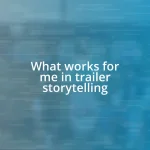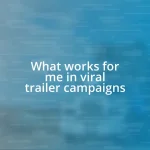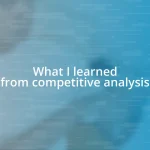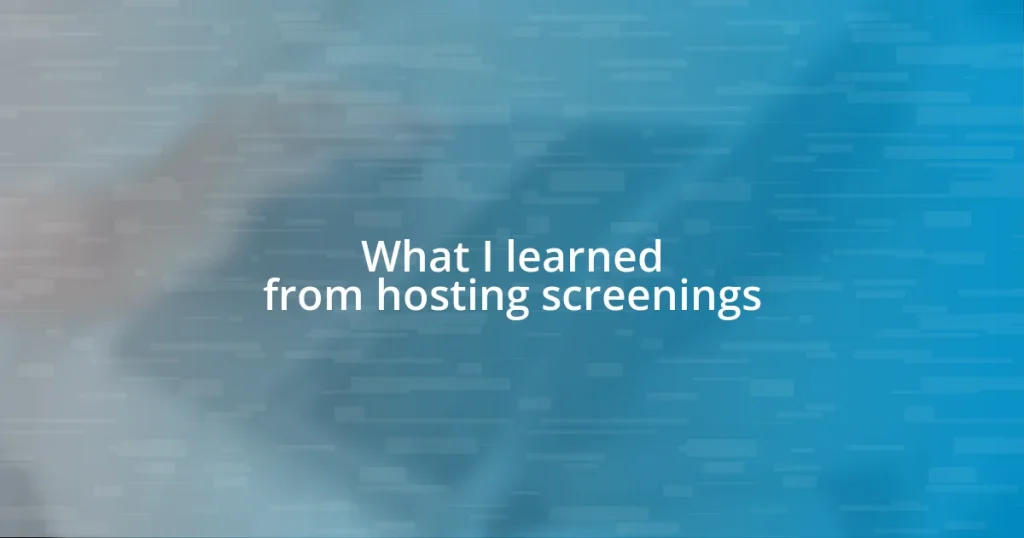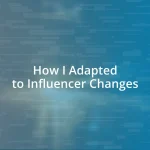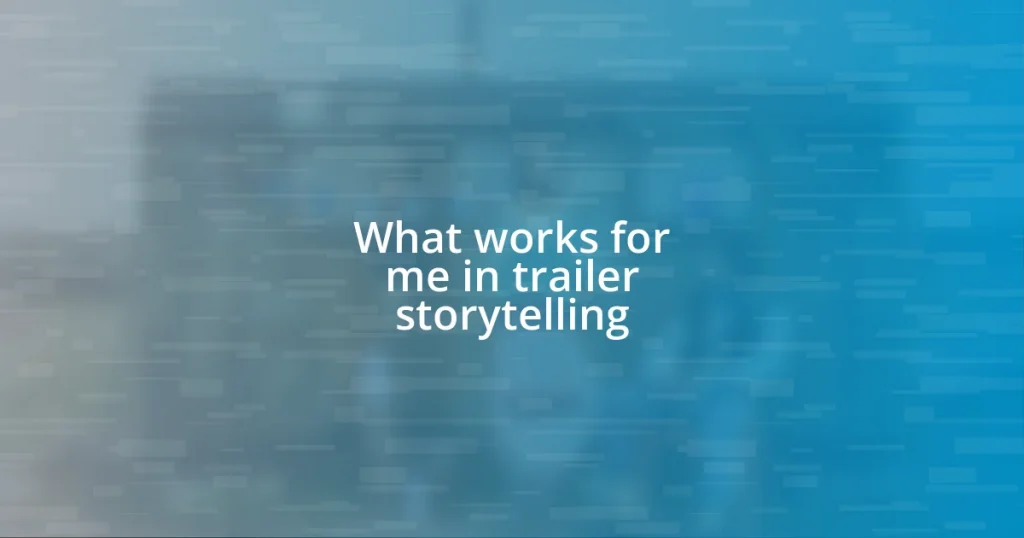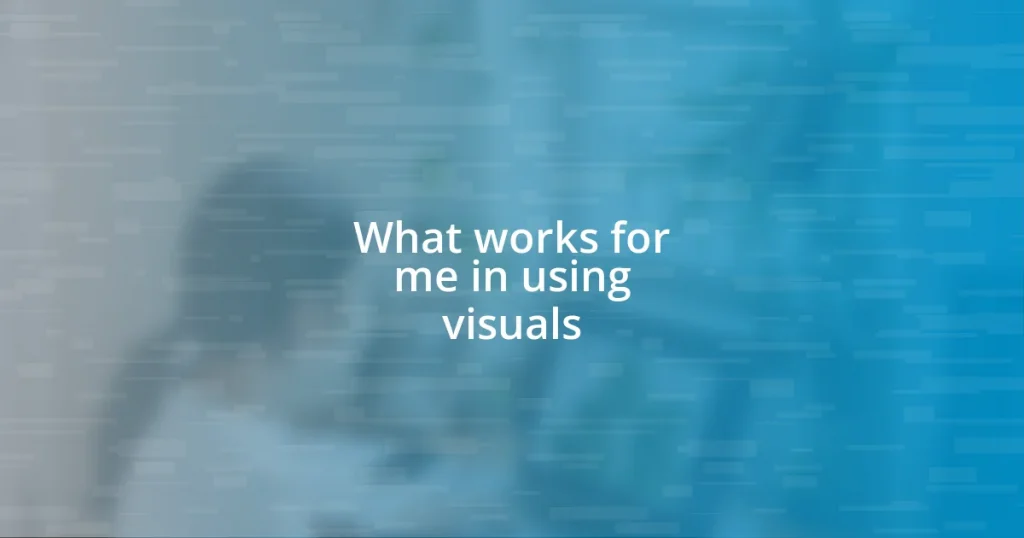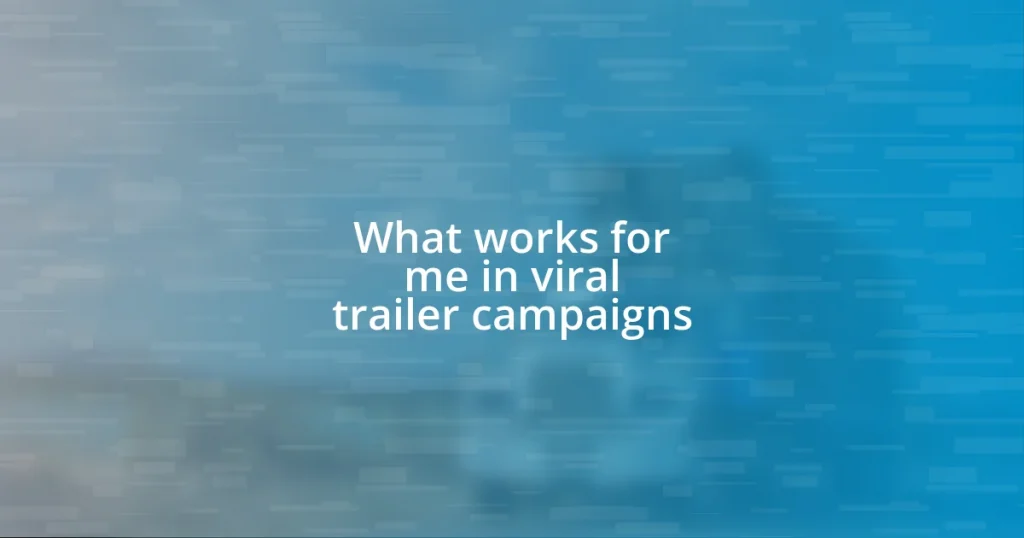Key takeaways:
- Screening hosting enhances audience engagement through community building, fostering connections, and encouraging discussions that deepen appreciation for film.
- Key skills for successful hosting include effective communication, adaptability to audience dynamics, and creating a welcoming atmosphere to promote openness.
- Collecting feedback and adapting future events based on audience input leads to personalized and enriching experiences that further strengthen community involvement.
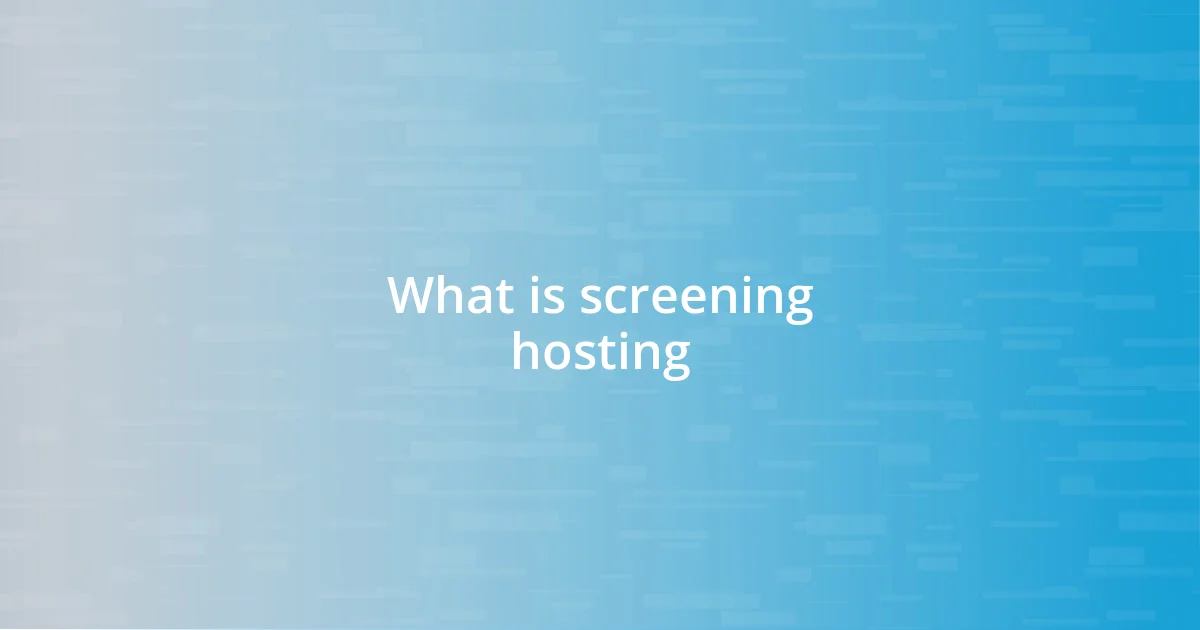
What is screening hosting
Screening hosting is the practice of organizing and facilitating movie or documentary screenings for an audience. In my experience, it goes beyond simply playing a film; it’s about creating an atmosphere that invites discussion and reflection. How often have you watched a film and wished you could share your thoughts with someone right after? That’s the magic of screening hosting.
I remember my first screening. The excitement mixed with nerves was palpable as I introduced the film and set the stage for an interactive experience. It was fascinating to see how the audience engaged with the film, sharing their reactions in real-time. There’s something powerful about watching a story unfold together, don’t you think?
Screening hosting also means curating follow-up conversations. I’ve found that these discussions can often lead to unexpected insights or new perspectives. Just like how one often finds parts of their own story reflected in a character’s journey, it creates a shared connection that brings everyone closer. How rewarding is it to know you’ve facilitated that moment?
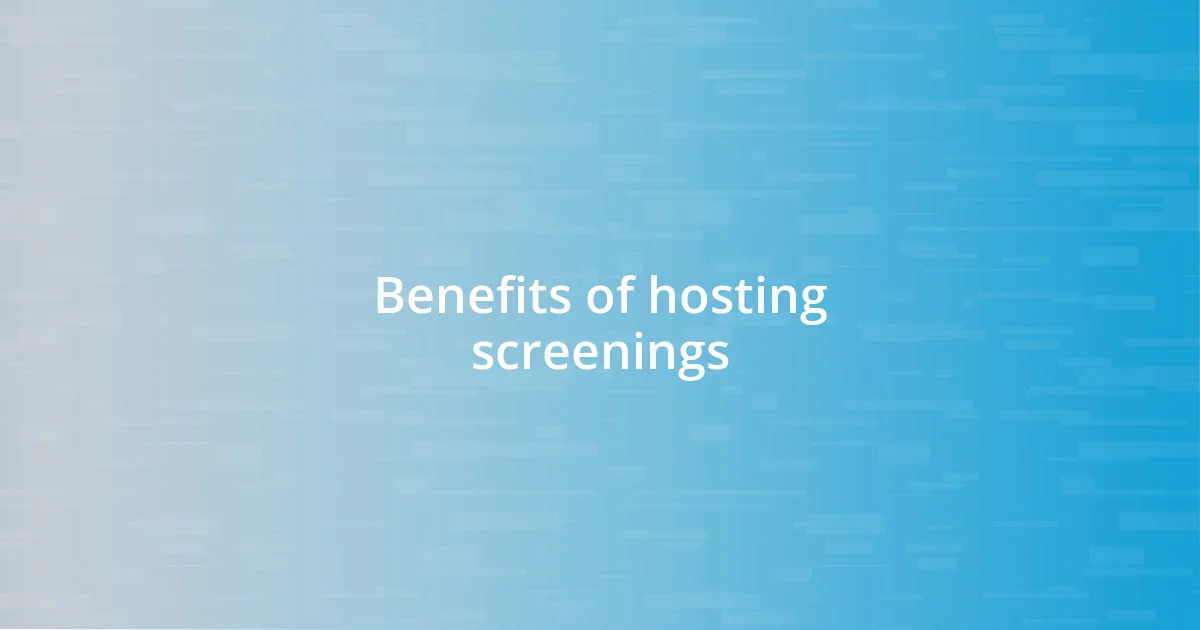
Benefits of hosting screenings
Hosting screenings truly offers a unique set of benefits that go beyond the simple viewing of a film. From my perspective, one of the most rewarding aspects is the sense of community it fosters. When I reflect on evenings spent in a dimly lit room, surrounded by fellow film enthusiasts, I feel a rush of anticipation. Watching their expressions change as the story unfolds creates a shared journey that’s difficult to replicate elsewhere. It’s fascinating to witness how a film can spark immediate reactions, laughter, or even tears, leading to spontaneous conversations afterward.
Here are some key benefits of hosting screenings:
- Community Building: It draws people together, creating connections through shared experiences and discussions.
- Enhanced Engagement: I’ve noticed that audiences are more likely to dive into conversations about themes and characters, enriching their understanding.
- Feedback Opportunities: It allows me to gather valuable insights from viewers that can shape future screenings or projects.
- Cultivating Appreciation: People often leave with a newfound appreciation for the art of filmmaking, which is gratifying to witness.
- Encouraging Expression: Screenings create a safe space for individuals to express their views, providing a platform for diverse voices to be heard.
I still remember the discussions that followed one of my early screenings, where an impromptu debate broke out about a film’s moral implications. The energy in that room was electric! It’s moments like those that really underscore the power of hosting screenings – bringing people together to share their thoughts and feelings in a deeply personal way.
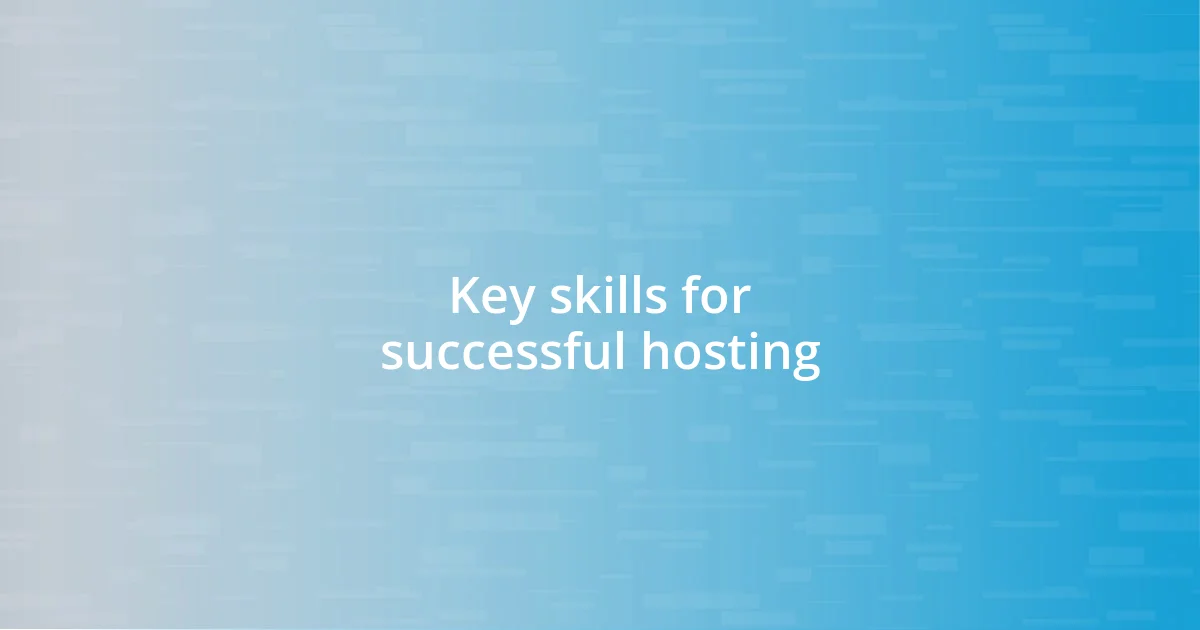
Key skills for successful hosting
One essential skill I’ve honed through hosting screenings is effective communication. It’s about more than just announcing the film; I’ve learned that setting the right tone requires clarity and enthusiasm. For instance, I vividly recall a night when I introduced a powerful documentary that touched on a sensitive topic. I approached the introduction with empathy, ensuring the audience felt comfortable and open to discussing their thoughts afterward. This not only engaged them but also came across as a genuine invitation to connect. It’s amazing how the right words can set the stage for a meaningful experience.
Another key skill that’s vital to successful hosting is adaptability. Each audience is different, and so is the energy that comes with them. There was a particular screening where the audience was initially quiet, almost hesitant to share their thoughts. I recognized that something needed to change, so I pivoted and initiated a more casual dialogue rather than a structured Q&A session. By doing so, I encouraged them to share their feelings more freely. The environment shifted instantly, transforming silence into spirited conversation. It’s a lesson I carry forward: the ability to adapt can truly shape the outcome of an event.
Lastly, I’ve realized how crucial it is to create a welcoming atmosphere. Prior to one screening, I focused on the ambiance, using soft lighting and comfortable seating. I even provided refreshments that reflected the theme of the film. The moment attendees walked in, I could see their apprehension fade away—it’s like setting the stage not just for a movie, but for a shared experience. When people feel welcomed, they’re more inclined to open up and engage, fostering richer discussions afterwards. It’s all about creating a space that feels like home, even if just for an evening.
| Key Skill | Description |
|---|---|
| Effective Communication | Setting the right tone and clarity in presentations to create an inviting atmosphere. |
| Adaptability | Adjusting to audience dynamics and initiating conversations that encourage participation. |
| Welcoming Atmosphere | Creating a comfortable environment that fosters openness and engagement. |
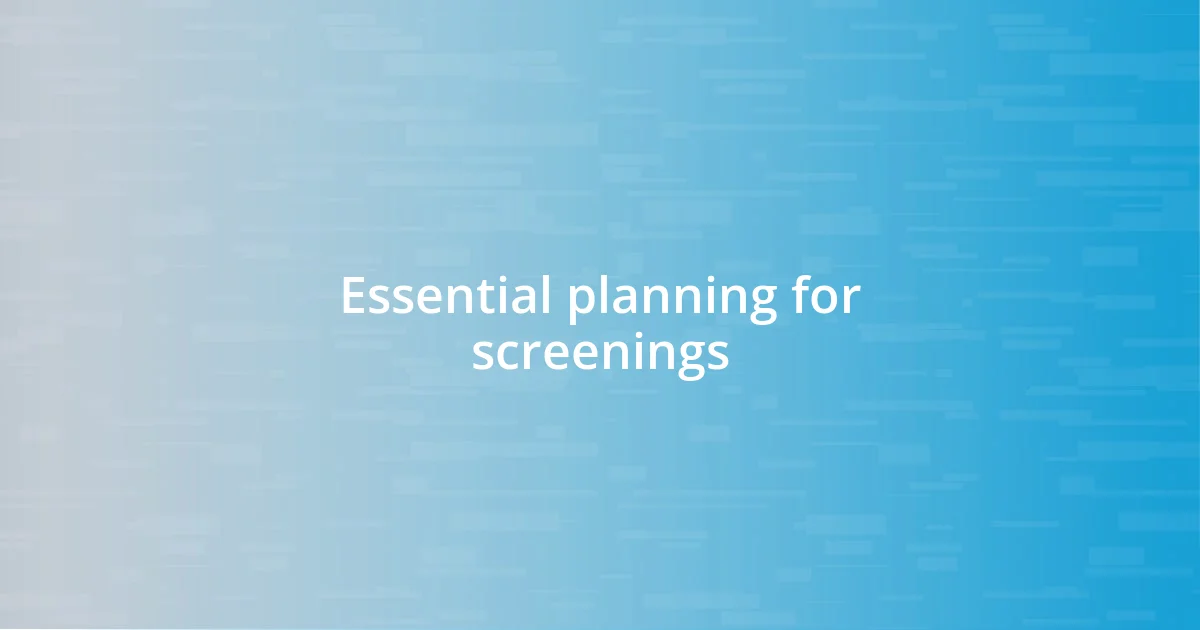
Essential planning for screenings
One of the first things I learned about essential planning for screenings is the importance of logistics. I recall a particularly chaotic evening where I underestimated the time needed to set up. I found myself scrambling to arrange seating, adjust the projector, and organize refreshments all while guests were arriving. It was a lesson in the value of a well-structured timeline. By mapping out each step in advance, I can ensure everything runs smoothly, allowing me to focus on what truly matters—connecting with the audience.
Creating a tailored experience can significantly enhance the screening. For instance, I once tailored a screening around a specific theme, complete with curated discussion points linked to the film’s context. This not only elevated the overall atmosphere but also made the attendees feel considered and engaged. Isn’t it rewarding when guests express how much the details made a difference? Thoughtful planning, such as incorporating pre-screening material or thematic decorations, can transform an ordinary event into something memorable.
It’s also crucial to think about the audience’s perspective during the planning process. I remember hosting a screening where I offered different formats for engagement. We had a casual setting that allowed for mingling before the film, which opened up conversations right away. This approach helped break the ice; people were sharing stories and insights before the screening even began. How often do we miss out on intimacy simply because we stick to formalities? Connecting on a more personal level right from the start sets the tone for deeper discussions later on.
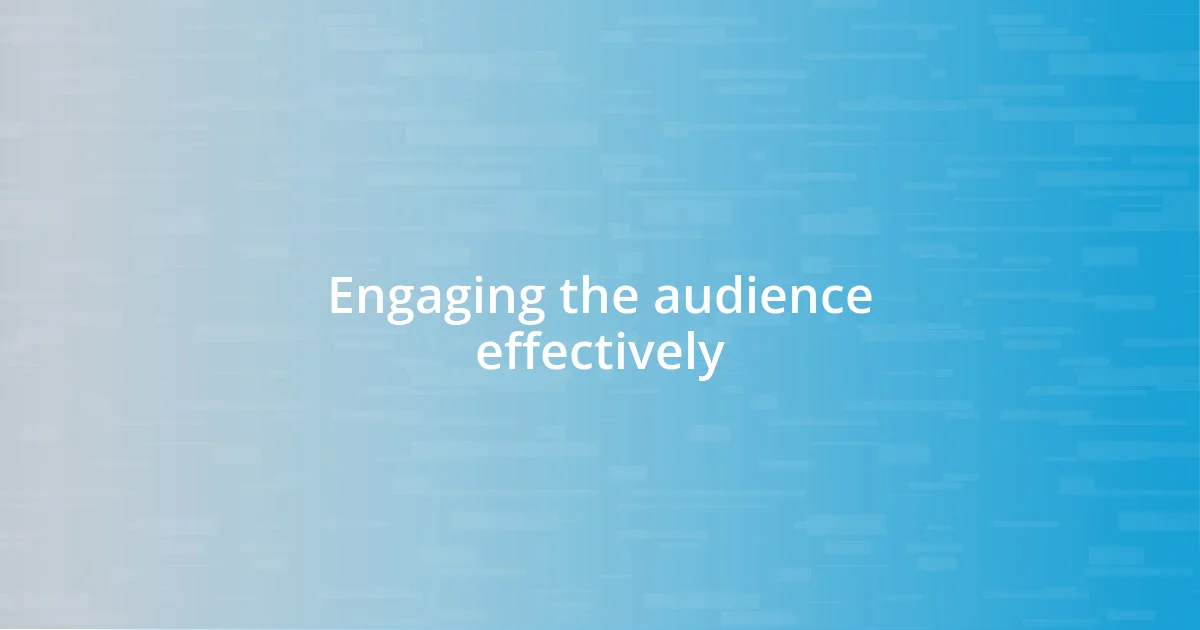
Engaging the audience effectively
Engaging the audience effectively is all about connection. I remember a particular evening when I experimented with icebreakers before the screening. Seeing participants share their expectations and personal stories created an immediate bond among them. It’s fascinating how just a few light-hearted questions can dissolve barriers, inviting everyone to invest emotionally in what’s about to unfold on the screen.
One remarkable technique I embraced was storytelling—this powerful tool effortlessly draws people in. At one screening, I shared a brief personal anecdote related to the film, revealing why that story resonated with me. The audience felt my passion, and I noticed more heads nodding in understanding. It made me realize that people relate better to raw, genuine experiences than to mere facts. Who can resist a heartfelt story? It’s a reminder that vulnerability often paves the way for authentic engagement.
Lastly, leveraging audience feedback in real time has been an eye-opener. During a lively discussion, I once encouraged everyone to share their thoughts right after a pivotal scene. The resulting dialogue transformed into a collaborative analysis, illuminating viewpoints I hadn’t considered. I saw the spark in people’s eyes as they found value in each other’s perspectives. Isn’t it inspiring to witness an audience growing together in understanding? That shared discovery is what truly makes hosting screenings rewarding.
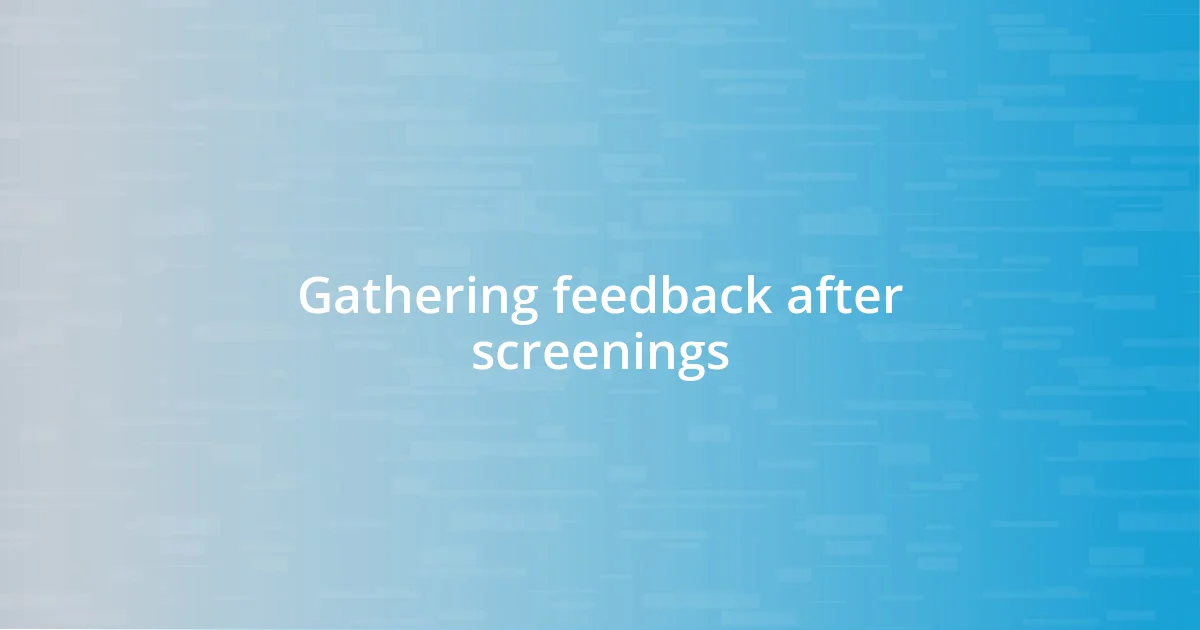
Gathering feedback after screenings
Collecting feedback after screenings has become one of my favorite parts of the hosting process. I remember a screening where I passed around a simple feedback form at the end. The responses were an eye-opener! Their insights didn’t just help me improve future events; they revealed nuances I hadn’t quite appreciated all along, like how a subtle detail of the film resonated with certain viewers. It’s incredible how a simple piece of paper can unlock a treasure trove of perspectives.
In another instance, I decided to spice things up by conducting a quick verbal feedback session right after watching the film. I asked questions that encouraged thoughtful responses, like, “What scene stood out to you most?” or “How did the film’s message relate to your own experiences?” Watching the energy shift in the room was magical. It was as if the audience suddenly felt their voices mattered, sparking a rich dialogue that continued long after the screening ended. Who knew a conversational approach could deepen connections in ways I never expected?
I’ve also experimented with anonymous online polls for tech-savvy audiences. This was particularly useful after a screening of a thought-provoking documentary. Not only did it allow those who may shy away from speaking up to share their thoughts, but it also made me realize that silence doesn’t always mean disinterest. The data revealed an entirely new dimension of engagement—a collective desire for deeper discussions about the themes presented. Isn’t it fascinating how much people want to share when given the right platform? Each form of feedback becomes a stepping stone for improvement and connection.
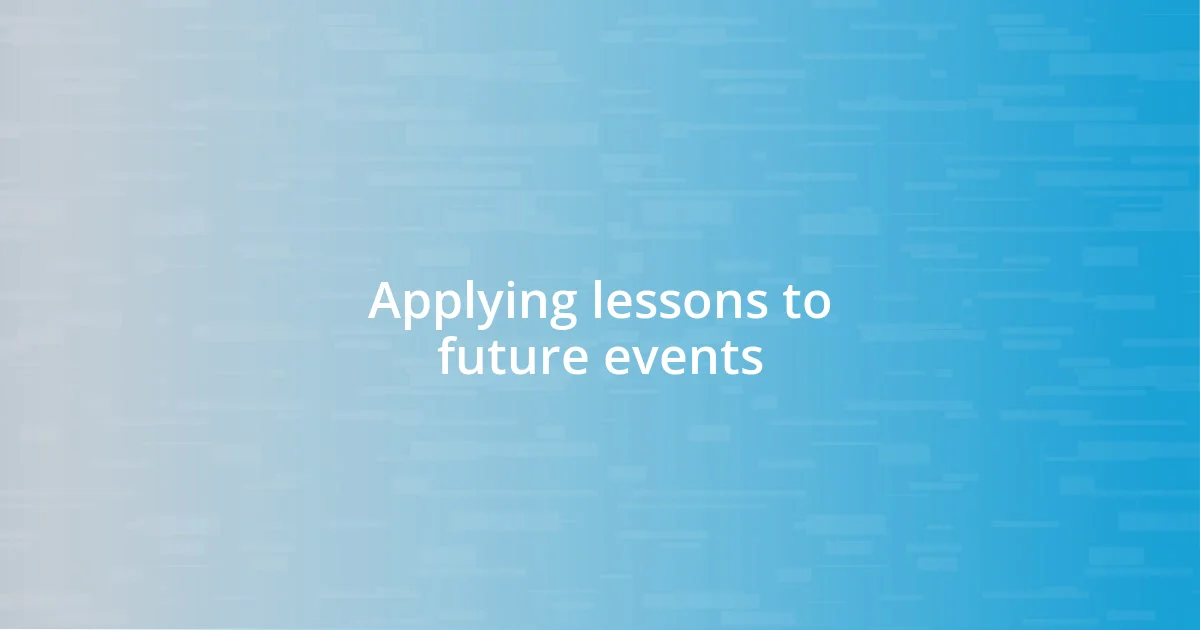
Applying lessons to future events
One lesson I’ve learned is the crucial role that pre-event surveys play in shaping future screenings. For instance, I remember a time when I sent out a questionnaire before a screening, asking participants about their interests and preferences. The responses not only guided my film selection but also helped me tailor discussions that resonated with the audience’s expectations. Isn’t it amazing how a little planning can create a more personalized experience?
I’ve also discovered that adapting the format of the event can enhance engagement. After one screening, I tried a workshop-style discussion where viewers could dive deeper into themes and share their interpretations. What surprised me was how much participants appreciated this interactive approach; they felt ownership of the evening. It was exciting to witness them take the lead and bond over their shared insights. Why not empower the audience to contribute more actively?
Lastly, I’ve come to value the iterative nature of hosting events. Each screening is a chance to refine my techniques, and I find joy in experimenting. After a particularly successful session, I implemented a new twist at the next event, inviting participants to vote on films for upcoming screenings. Their enthusiasm was infectious, and it created a community atmosphere. How rewarding it is to see so many faces light up with anticipation for what’s next!

